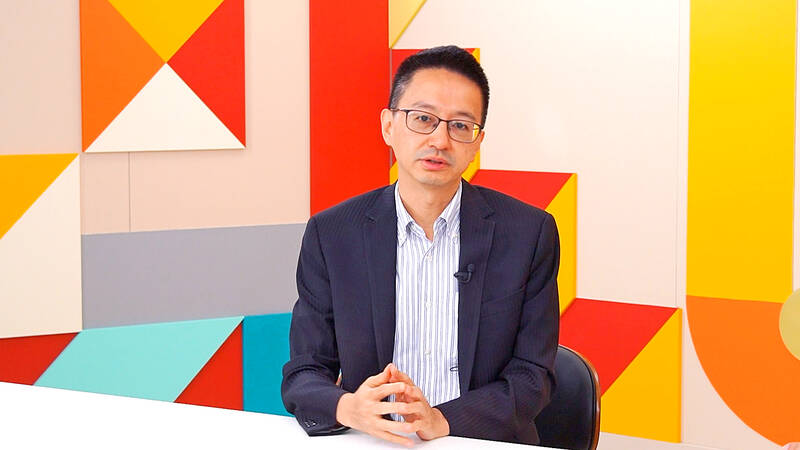People should wash their hands and cook food thoroughly during Mid-Autumn Festival barbeques amid a surge of enterovirus infections, a top health official said yesterday.
Taiwan has reported an increase in enterovirus cases, including norovirus infections, at the end of summer, when the transmission season has typically ended, Centers for Disease Control (CDC) Deputy Director-General Philip Lo (羅一鈞) said in an interview with the Liberty Times (the Taipei Times’ sister paper).
The situation might be linked to travel and social gatherings increasing after the COVID-19 pandemic, Lo said, adding that 74 groups of students had been sent home during the first week of classes in the new semester in a bid to prevent enterovirus outbreaks.

Photo: Chen Yu-jui, Taipei Times
About 14,000 enterovirus cases are being reported per week and the rate is unlikely to drop due to increased risks of community spread during the Mid-Autumn Festival, he said.
The CDC is especially concerned about norovirus, which has been the cause of more than half of the cases in the past four months, Lo said, adding that enteroviruses are resistant to alchohol and can only be killed by washing with soap.
Norovirus is known as the “Ferrari” of viruses at the CDC for its ability to rip through communities with a minute amount of fecal contamination, he said.
People should make sure shellfish are cooked properly, because improperly barbecued oysters have been linked to 47 norovirus outbreaks in the past six months, he said.
Oysters should be cooked to a core temperature of 66°C to neutralize norovirus, meaning they should remain on the heat for three to five minutes after their shells have opened, he said.
Separately, newborns and elderly people would be eligible for subsidized influenza and COVID-19 vaccines starting next month, Lo said, adding that other groups would be eligible after that.
Taiwan has access to more types of flu vaccines than ever, with products from Adimmune, Sanofi, BioPharm, Medigen and GSK available, he said.
The vaccines confer good protection against the H1N1A and H3N2A subtypes of influenza A, as well as several subtypes of influenza B, including H3N2, which has been reported in Thailand, Lo said.
People are twice as likely to have severe symptoms or die from COVID-19 than the common flu, despite significant progress in reducing the danger posed by SARS-CoV-2, he said.
Taiwan offers subsidized COVID-19 vaccines, as the disease remains a threat to public health, he said, adding that jabs designed to counter the JN.1 variant would be available from December.
People should be inoculated against influenza and COVID-19 before expected flare-ups of the diseases in November and December, he said, adding that masks alone do not provide adequate protection.

Beijing could eventually see a full amphibious invasion of Taiwan as the only "prudent" way to bring about unification, the US Department of Defense said in a newly released annual report to Congress. The Pentagon's "Annual Report to Congress: Military and Security Developments Involving the People's Republic of China 2025," was in many ways similar to last year’s report but reorganized the analysis of the options China has to take over Taiwan. Generally, according to the report, Chinese leaders view the People's Liberation Army's (PLA) capabilities for a Taiwan campaign as improving, but they remain uncertain about its readiness to successfully seize

Taiwan is getting a day off on Christmas for the first time in 25 years. The change comes after opposition parties passed a law earlier this year to add or restore five public holidays, including Constitution Day, which falls on today, Dec. 25. The day marks the 1947 adoption of the constitution of the Republic of China, as the government in Taipei is formally known. Back then the Chinese Nationalist Party (KMT) governed China from Nanjing. When the KMT, now an opposition party in Taiwan, passed the legislation on holidays, it said that they would help “commemorate the history of national development.” That

Taiwan has overtaken South Korea this year in per capita income for the first time in 23 years, IMF data showed. Per capita income is a nation’s GDP divided by the total population, used to compare average wealth levels across countries. Taiwan also beat Japan this year on per capita income, after surpassing it for the first time last year, US magazine Newsweek reported yesterday. Across Asia, Taiwan ranked fourth for per capita income at US$37,827 this year due to sustained economic growth, the report said. In the top three spots were Singapore, Macau and Hong Kong, it said. South

Trips for more than 100,000 international and domestic air travelers could be disrupted as China launches a military exercise around Taiwan today, Taiwan’s Civil Aviation Administration (CAA) said yesterday. The exercise could affect nearly 900 flights scheduled to enter the Taipei Flight Information Region (FIR) during the exercise window, it added. A notice issued by the Chinese Civil Aviation Administration showed there would be seven temporary zones around the Taiwan Strait which would be used for live-fire exercises, lasting from 8am to 6pm today. All aircraft are prohibited from entering during exercise, it says. Taipei FIR has 14 international air routes and